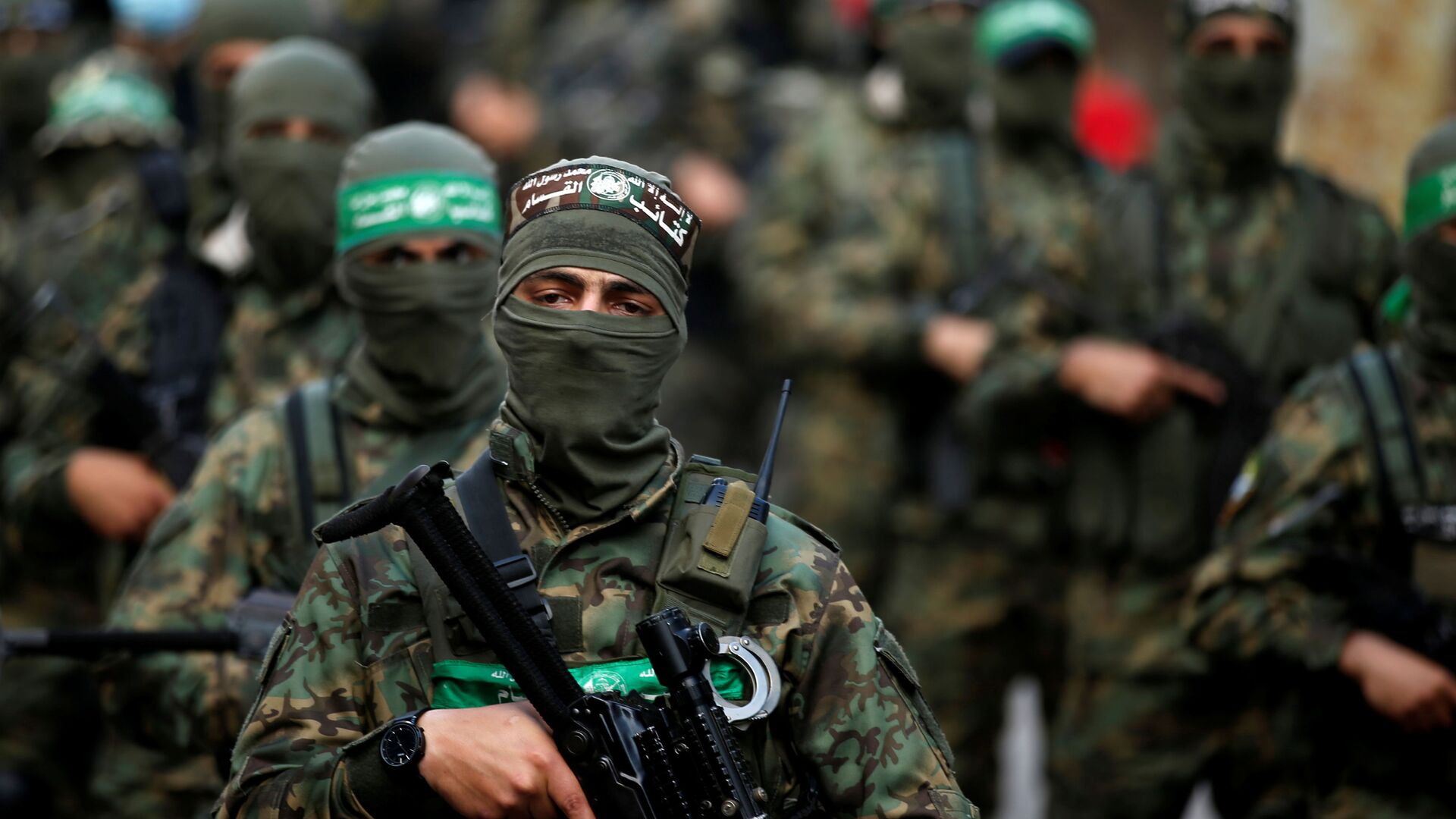As Hamas' Popularity Grows, Analyst Says It Won't Trigger a Full-Scale Confrontation With Israel
09:32 GMT 24.11.2021 (Updated: 09:33 GMT 24.11.2021)

© REUTERS / MOHAMMED SALEM
Subscribe
A recent poll revealed that 45 percent of Palestinians considered the Islamic group to be their true representative. 56 percent viewed Hamas chief Ismail Haniyeh as suitable for the presidential post. His main opponent, the leader of Fatah, Mahmoud Abbas, has only gotten the support of 34 percent.
On Monday, Israel buried Eliyahu David Kay, the victim of Sunday's terror attack, reportedly conducted by a Hamas activist in Jerusalem's Old City.
The event, which has also seen five people injured, including Israel's security forces, has drawn massive condemnation from the country's right- and left-wing circles.
Warm Embrace
But in the West Bank, the shooting attack and the organisation that took responsibility for the assault had received a warm embrace from the Palestinian public.
Social media websites have been flooded with pro-Hamas comments. Videos, where ordinary Palestinians justify the attack, have been widely circulated, whereas youngsters in Jerusalem have been raising the flag of Hamas and have been wearing T-shirts with the images of its leaders.
رأي الشارع الفلسطيني بعملية القدس التي نفذها القيادي في حماس فادي أبو شخيدم pic.twitter.com/E9QbC0u5YZ
— وكالة شهاب للأنباء (@ShehabAgency) November 22, 2021
"In recent months, Hamas has been gaining more supporters in the West Bank and Jerusalem, mainly after the military confrontation with the Israeli army that took place in the Gaza Strip in May," said Hani Al Masri, one of the leading political analysts based in Ramallah, referring to the Guardian of the Walls operation that claimed the lives of more than 250 Palestinians and 13 Israelis.
The Guardian of the Walls operation took place in May; it was started by Tel-Aviv in response to a barrage of rockets that emanated from the Gaza Strip. During the eleven days of fighting, the Jewish state destroyed multiple sites belonging to Hamas militants, causing significant damage to the enclave's infrastructure, including roads, hospitals, police stations, mosques and residential buildings.
"The people of Jerusalem have become more supportive of the group because they believe Israel cannot be stopped peacefully and democratically. So they pin their hopes on Hamas, whom they consider as the strongest player, and they want the group to punish the Israelis for their violations against the Palestinians," he added.
A recent Palestinian poll backs Al Masri's claims. In September, just three months after the Guardian of the Walls confrontation which claimed the lives of 12 Israelis and 260 Palestinians, it was reported that 45 percent of Palestinians considered Hamas as their true representative. Only 19 percent of respondents could say the same thing about Fatah, the main rival of the Islamic group, that controls the West Bank.
That same poll has also indicated that if presidential elections were held today, the leader of Hamas Ismail Haniyeh would receive 56 percent of all votes. His main opponent, the leader of Fatah, Mahmoud Abbas, would have only gotten 34 percent.
Growing Concern
The rising popularity of Hamas has already been causing unrest among the Palestinian Authority leadership. On Sunday, in an attempt to curb their threat, Abbas launched a large-scale military operation in the northern city of Jenin in an attempt to regain control over the area, which has largely been associated with Hamas and other extremist groups.
The operation is set to continue for weeks and it will include major arrests, weapons confiscations and the exchange of fire.
"There is no doubt that Hamas has been threatening the position of Abbas and the stability of the Palestinian Authority. And the Palestinian leader will do everything it takes to curb that threat".
That also means boosting the PA's security cooperation with Israel, which over the years has seen many ups and downs.
Last week, Abbas met with the chief of Israel's inner security agency, the Shin Bet, and mulled over tighter coordination with the Jewish state on issues pertaining to the threat of Islamists.
Al Masri says that it is in the interest of Israel to keep that coordination with Abbas intact, specifically because Hamas, deemed terrorist by the Jewish state and a number of other regional players, has been a major headache for officials in Jerusalem.
After the Guardian of the Walls operation, Israel has also been relying on the help of the Egyptian mediators and was hoping that the partnership with Cairo would establish a long-lasting quiet in the turbulent region.
Although the intention is there, three days after the attack tensions are still up in the air in Jerusalem's Old City. But Al Masri is certain that it won't deteriorate into another bloody confrontation between Israel and the militants of Hamas.
"I doubt it will happen, mainly because there are the Egyptian and the Qatari mediators involved. And those are negotiating between Hamas and Israel, and they are exerting maximum efforts into avoiding any new escalations".
